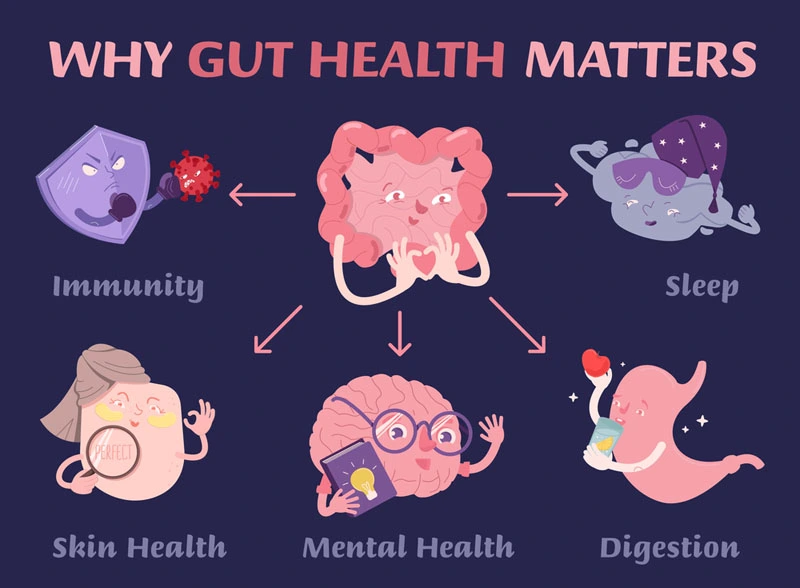Gut health and mental health are intricately interconnected, a concept increasingly supported by cutting-edge scientific research.
Our gastrointestinal system is responsible for digesting food and absorbing nutrients and is important to our overall mental well-being.
The gut, often called our ‘second brain,’ is lined with a vast network of neurons communicating with our brain, influencing mood, cognition, and mental health. Imbalances in the gut microbiome have been linked with various mental health disorders, highlighting gut health’s essential role in maintaining mental equilibrium.
Introduction to Gut Health
Our bodies are complex systems, and one of the most fascinating parts of this system is our gut health. More than just a conduit for processing food, the gut, with its vast microbiome, plays a significant role in overall health and wellness.
The collection of microflora, including bacteria, viruses, and fungi that call our digestive tract home, profoundly impacts various bodily functions, from the immune system to mental health.
Understanding gut health begins with appreciating the role of these microscopic inhabitants, particularly the beneficial bacteria that dwell in our digestive tract. This microscopic community forms a world, affecting nutrient absorption, immune response, and even our mental state.
Probiotics and Gut Health
Probiotics are a major player in maintaining a healthy gut microbiome. Probiotics are live microorganisms that confer a health benefit to the host when consumed in adequate amounts. They exist naturally in fermented foods like yogurt, kefir, and sauerkraut.
Additionally, probiotics are available as dietary supplements, offering a direct approach to enhancing gut health.
Studies have indicated that these helpful bacteria can alleviate several digestive issues, like Irritable Bowel Syndrome (IBS), inflammation, and problematic Leaky Gut Syndrome.
Probiotics restore the gut microbiome’s natural balance, preventing harmful bacteria from taking over and causing disease.
Introduction to Mental Health
Mental health refers to our emotional, psychological, and social well-being, and it’s as important as physical health. It affects how we think, feel, and act and influences how we handle stress, relate to others, and make choices.
Mental health disorders have recently been recognized as a global health problem. Conditions like depression, anxiety, and mood disorders are prevalent and can significantly impair a person’s quality of life. Therefore, it’s important to understand the various influences on mental health, and interestingly, one such influence is our gut health.

The Gut-Brain Axis
The idea that our gut health can impact our mental state might be surprising, but it is rooted in a robust biological concept – the gut-brain axis. This complex system facilitates communication between the gut and the brain, creating a two-way street of constant interaction.
The gut-brain axis involves various biological systems, including neural, hormonal, and immune pathways.
One key element in this relationship is the role of neurotransmitters, chemicals responsible for transmitting messages in the brain. Amazingly, a large portion of these neurotransmitters, such as serotonin and dopamine, is produced in the gut. This fact alone illustrates the profound influence the gut can have on our mental state.
Research on the Gut-Brain Connection
Recent research on the gut-brain connection has shed light on the remarkable influence of the gut on mental health. Numerous studies on humans and animals have indicated that a disrupted gut microbiome can lead to mental health disorders.
For instance, certain strains of gut bacteria have been linked to increased stress levels and depressive behaviors.
Evidence from these studies has supported the concept of “psychobiotics.” These are specific types of probiotics that have potential mental health benefits. Research on psychobiotics, though in its early stages, holds promise for future interventions targeting mental health through gut health.
Probiotics and Mental Health
Probiotics, particularly psychobiotics, represent a potential strategy for enhancing mental health. By influencing the balance of the gut microbiome, probiotics may indirectly affect brain function, positively impacting mental health disorders like depression and anxiety.
Moreover, some studies suggest that probiotics could have a role in producing neurotransmitters, which are critical for maintaining mental well-being. Therefore, a diet rich in probiotics or the use of probiotic supplements could potentially offer a novel approach to managing mental health.
How to Improve Gut Health
Improving gut health involves a few important steps. Firstly, a diet rich in dietary fiber can boost the health of the gut microbiome. This includes whole grains, fruits, and vegetables, which benefit gut bacteria.
Secondly, incorporating fermented foods, which are naturally high in probiotics, can improve the balance of bacteria in the gut. Additionally, probiotic supplements can be an excellent addition to a gut-friendly diet.
Lifestyle changes are also essential. Regular exercise is linked to a healthier gut, and managing stress can positively impact gut health. Avoiding smoking and excessive alcohol is also beneficial to gut health.
Finally, gut health can be negatively affected by the overuse of antibiotics, which can disrupt the balance of the gut microbiome. So, using these medications responsibly under a healthcare provider’s guidance is important.
Conclusion
The exciting research surrounding the gut-brain axis demonstrates a profound connection between gut health and mental well-being. Maintaining a healthy gut microbiome through a balanced diet and lifestyle changes may unlock a new pathway toward improving mental health. It’s a testament to the interconnected nature of our bodies and an invitation to view health from a holistic perspective.
Frequently Asked Questions
How does the gut microbiome change throughout a person’s lifespan?
The gut microbiome evolves throughout our lives. It begins to form at birth and is significantly influenced by factors such as diet, environment, and lifestyle. It’s also known that aging is associated with changes in the composition and function of the gut microbiome.
Can improving gut health help with sleep disorders?
Emerging research suggests a link between gut health and sleep quality. Certain strains of gut bacteria are known to produce neurotransmitters involved in sleep regulation, indicating that a healthy gut could potentially contribute to better sleep.
Can changes in gut health be a sign of serious health conditions?
Alterations in gut health can sometimes signal serious health conditions, including Inflammatory Bowel Disease (IBD) and obesity. Persistent changes in digestion, bowel habits, or discomfort should be addressed with a healthcare provider.




